Pausing to Process at the Pacific (post-election revision)
picking up shards of memories as I walk the rain-soaked sand
My Substack drafts in queue are about the overwhelm so many are feeling in this moment: escalating climate disasters, chronic and painful news of genocides’ brutality, the awful possibilities inherent in the insane politics of this moment, the cruel manipulations of greedy billionaires, the discouragement caused by the continuing Pandemic and long COVID, the mental health crisis, and the burnout, powerlessness, and despair that so many are feeling. Not surprisingly, I didn’t want to spend time with any of that as I sat down to write this post. I think we are all getting saturated by the intensity of this time even if the messes are only in your peripheral vision. So as I allow these words to flow, I have a specific intention set by my need to restore and regenerate for the times ahead, so please allow me the indulgence to settle in with the rhythm of waves and the blustery coastal weather of the Pacific Northwest.
I arrived at Long Beach, Washington on Monday, 10/28/2024, to honor my late partner’s 76th bday. It’s the second of his bdays without his physical presence. Last year I knew that I had to come to the ocean to breathe in my grief, especially having not left home for over a year of caregiving. Thanks to a sangha member’s willingness to care for my son, I was able to grab a few precious days, a bit further north on this long spit of land, at the “Goddess Cabin” at Shakti Cove Cottages in Ocean Park. Those days were rich with beauty and insight. The ache in my heart was present, but I kept most of the gaping hole at bay listening to podcasts with profound ideas while I walked and sat on the beach. The weather was glorious, the moon was full, and crowds of razor clam harvesters were on the beach, creating patterns in the sand with their digging tools.
This year, I decided to stay in the same hotel that Bob and I had visited both before and during the Pandemic. We chose it due to its location (right on the beach), its restaurant with a decent menu (Pickled Fish), and the free bikes for traveling the awesome beach trails. We stayed there several times, relishing everything except the thin walls: the incessantly barking dogs and screaming children during our last visit (March 2021) made us vow to find another place to stay with more sound insulation. We didn’t have to do the latter research because within 7 months, Bob had been diagnosed with an aggressive skin cancer. With a couple of exceptions, our road trips were mostly to hospitals or to help our son relocate.
One of my friends said that I was brave to return here this year, given how many memories were embedded in this place, but I told her that after 18 months, I’m ready to dive into the pain of loss with less distraction. I see it as an initiation now, especially given how much compounded loss we are experiencing as a collective. We can let the pain paralyze us or it can allow us to shed old patterns and perspectives, and deepen our empathy, and become someone new. As Rumi and Leonard Cohen have said in similar ways (and please forgive what may seem clichéd to you): the cracks in our hearts allow the light to enter.
When I arrived at the hotel last Monday, I was a bit early for check-in, and told the receptionist that I would just walk on the beach until my room was ready. She looked up my reservation and told me that I could move into my room, if I wanted to; it was ready for me and I would not need to pay an early check-in fee. I was pleased to hear that and then asked her if my room had a view of the ocean, and she said, “just a tiny view, but you can definitely upgrade to a great view.” She listed all the options & prices, and I responded by saying, “today is my late husband’s bday. He died exactly 18 months ago on his half bday. We stayed here several times and loved it, but I’m not sure I need the best view since I’ll be walking on the beach every day.” One of the receptionists, smiled at the other, and said, “please enjoy a free upgrade.” I found myself in a room with a spectacular view of the ocean: another example of Bob’s magic. The hotel was practically empty off-season and my heart was able to rest in that spaciousness and quiet.
The glorious view of the ocean on Tuesday, October 29th, the sunniest day of the trip
Bob’s birthday dinner in the hotel’s restaurant included an order of one of his favorite treats, New England clam chowder. It’s a dish that I typically avoid, as much as I love the taste, due its rich dose of heavy cream. I couldn’t finish it, but I felt that Bob’s spirit felt soothed by the half bowl (I’m not sure how soothed my inflammatory response was…).
After dinner, I attended a grief ritual on Zoom, facilitated by one of the women who co-led the grief retreat that I had attended on Vashon Island the weekend before. The online conversations with fellow grievers offered some gentle comfort and connection to ground me into my time at the ocean, but there was no comparison with the circle of embodied grievers who came to Vashon the weekend before.
In the latter retreat, I was part of an intergenerational circle of 40 people who came from all over North America. With the help of four facilitators, we built a powerful experience together, sharing our vulnerability and stories. There were shared griefs about loved ones, about the damage being done to the ecosystem, and the brutal harm caused by patriarchy and the genocides around the world. The four facilitators holding the space read us poems, taught us songs and chants, and shared parts of the work of Francis Weller (The Wild Edge of Sorrow). They invited us into a process that had been gifted by the Dagara people of Burkina Faso. About ten years ago, I had done a weekend with the late Sobonfu Somé who introduced this grieving ritual to North Americans. This first retreat with Sobonfu offered me a quick immersion into the ritual chant, drumming, and dancing that created the energy of the “village,” and the portal that allowed each griever to approach the altar with a witness. I learned that being a witness was a powerful role, listening and holding the energy for the griever; offering a hand, a back rub, or a hug, if requested.
The community who came together ten years ago with Sobonfu seemed very experienced. I envied their ease with the grieving process. I had a hard time letting go and crying. It felt performative and my efforts to solicit tears just felt wrong. I was too much in my head to let go and I did not feel transformed by the retreat, just insecure, like I failed. This time, on Vashon, the facilitators prepared us for all sorts of responses to our griefs - no response was wrong and all were welcome: stony silence, dry eyes, pounding the floor in rage and frustration, quiet meditation, and some long sighs were all part of the spectrum of grief.
As soon as we arrived on Friday afternoon, the community started building the altar together with artifacts and photos that they brought from home. By the end of the second day, we expanded the altar with bundles we had assembled during a walking meditation on the land. On the evening of our chanting/dancing ritual, the altar felt ripe and charged with the energy of the community. With the kind of permission that we all had been offered, everyone was able to approach and kneel at the altar several times. Because I was carrying so much compounded sorrow between the loss of my beloved companion and collaborator, my son’s difficult journey, and the pain of so many in harm’s way around the world, it was no longer challenging to process my load of emotions: I was wailing, screaming, and pounding the pillows on the floor while I curled into into “child’s pose” in front of the altar. And when I returned to the “village” of fellow grievers, dancing and chanting, I was welcomed back with love, thank you’s, and big hugs.
One of the last rituals of the weekend was the procession to the fire pit overlooking the bay where we released the bundles we had made from walking the land and collecting bits of the earth’s fall release. Some bundles were beautiful bouquets of decay and fecundity and others were tightly bound packages and pods of secrets. I gloried in their diversity. We were invited to say a few words as we threw our bundles into the fire. As I stood at the edge of the pit, looking up through the serene & golden/green/gray lattice of tree branches above, and down at the fragment of the Salish Sea floating by, intense memories flooded in, many of them loaded with sorrow; I knew that I was breaking open again. My words flowed out: “Breaking open, surrendering to the unknown” as I tossed my bundle into the fire. I relished the flames licking all the disintegrating bundles and watched them easily become ash and smoke. I was grateful that the smoke was not blowing my way and wished for a deep release for all of the grief that our circle was carrying.
That’s really all we can do, witness and hold space for the pain, even as we make come to terms with a frightening political horizon, posting about the latest horror to our social media “friends,” as we gather for public interventions and step into another level of grass roots organizing. Our humanity is being tested in ways that some of us have imagined and others have gone numb to. The immoral and unfathomable cruelty of world leaders and their lackeys seems impossible to process or shift, but I am confident that the earth can digest it all. That is my surrender, and while it is not explicitly joyful, it is one that I can sit with for now.
Before I close this section about the grief retreat, I should mention that the location was particularly tender given that we shared our meals in a space where my son had graduated from Middle School and where Bob and I had introduced Joanna Macy to our community. The shell-covered beach below the camp was one that my family and I had walked on during low tide when we first lived on the island in 2003. As these memories flooded my heart, I learned to accept the pain (or sweetness) that they carried and breathe through them. No one else in the group had this relationship to the place of the retreat. Most of my fellow participants were visiting the Island for the first time, and just saw it as a pretty location, like good tourists. I shared stories with a few of them to deepen their understanding of the complexity of its history.
When I returned home from the grief retreat, a friend asked me how I felt sitting in a space with mostly white folks, participating in a ritual whose roots came from the indigenous people of Burkina Faso. I felt some uneasiness, at first, but I reminded both of us that we all come from indigenous roots, and that the ones held by folks with European origins have been disrupted in painful ways over many centuries by the conquests of patriarchal religions and other colonizers. So much of the inherited racism, homophobia, and misogyny is a trauma response that has not been tended to, but instead, weaponized. This is, of course, a longer discussion, but I was grateful when the facilitators asked us to make donations to the Dagara community who have been struggling with food scarcity and clean water, and to the local Puyallup school for the reclaiming the native language, Twulshootseed.
As the days passed during my ocean retreat, full of reflections about the panic being ratcheted up in other realms, I felt well held by my many walks on the beach, even when my shoes got soaked by rogue waves (on two consecutive days, no less) and intermittent rain showers. Unsurprisingly, I had an occasional argument in my head about the appropriate way to grieve so I could really be in touch with my feelings, but I had more compassion for myself than I would have had in the past. Sometimes, I would wear headphones and listen to music that would stir up memories, so I could more deeply experience the pain in my heart. For a year, I could barely allow myself to listen to music, except in the context of my dance community. When the intensity of what I was feeling seemed to rock me off balance, I sought comfort in the antics of sea birds. The seagulls were hilarious at times, and then particularly aggressive if they suspected that I had food in my pockets. My favorite companions on these walks were the speeding locomotive dances of the sandpipers.
My last two nights at the ocean, I had the unexpected pleasure of listening to the live music of Bees in a Bottle. Since I’ve been asking people to call me “Bee” in the past year or so, their presence as a folk/rock duo in the restaurant down the hall from my room felt like a sweet synchronicity. After the first night of enjoying their soulful songs, I ran into Christine, the lovely, red-headed singer in the duo, in the lounge the next day. We ended up talking and drinking tea for what seemed like hours. It was a very deep conversation to have with a stranger, about loss, overwhelm, spirituality, the politics of this moment, and how to ground in these times. Discovering their songs on Apple Music has helped me finish this post.
Finally, I can say in this day after the election, a day of deep grieving for so many fellow humans, that I’m immensely grateful for the recalibration I experienced last week, walking by the salty waves, liberating me from a certain kind of heaviness, offering me good boundaries from the overwhelm I am sensing around me.
We need our strength because there’s going to be a lot of work to do, diving into or continuing to build movements that will bridge this polarizing time, while creating emergent strategies for the challenging times ahead.
I want to stay present for both the grief and the gratitude, but it is a discipline. If you woke up feeling that you were just a worn-out cork, bobbing in a sea full of micro-plastics, welcome to one of the feelings that grabs me when I’m not feeling centered.
I looked into my worn-out cork heart this morning and tried to reset it’s tendency to grab onto catastrophes. I have been learning how to surrender to what I can’t control. My husband’s cancer, my son’s journey with mental health, the limitations of my own body and its mortality (the Five Remembrances are useful here), the weather and its impact on my garden’s yield and the price of food - all of these challenges have required a lot relinquishing and acceptance, although not without some very reluctant feelings of failure. Still, there’s another part of my brain/heart/body that needs to ground - after all, this Substack is called “gravity humming” for a reason. So how do I reframe that which disappoints, that which is terrifying, and have fewer expectations for “happy endings?” This is the work, the real work, it seems. And it requires the energy of others, friends and strangers, to manifest into something tangible beyond my writing and making art.
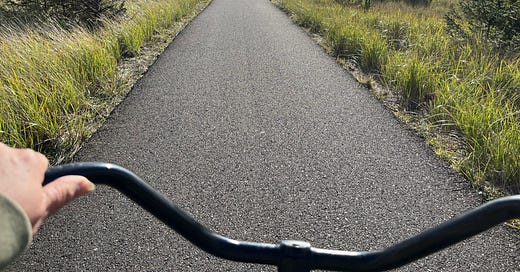



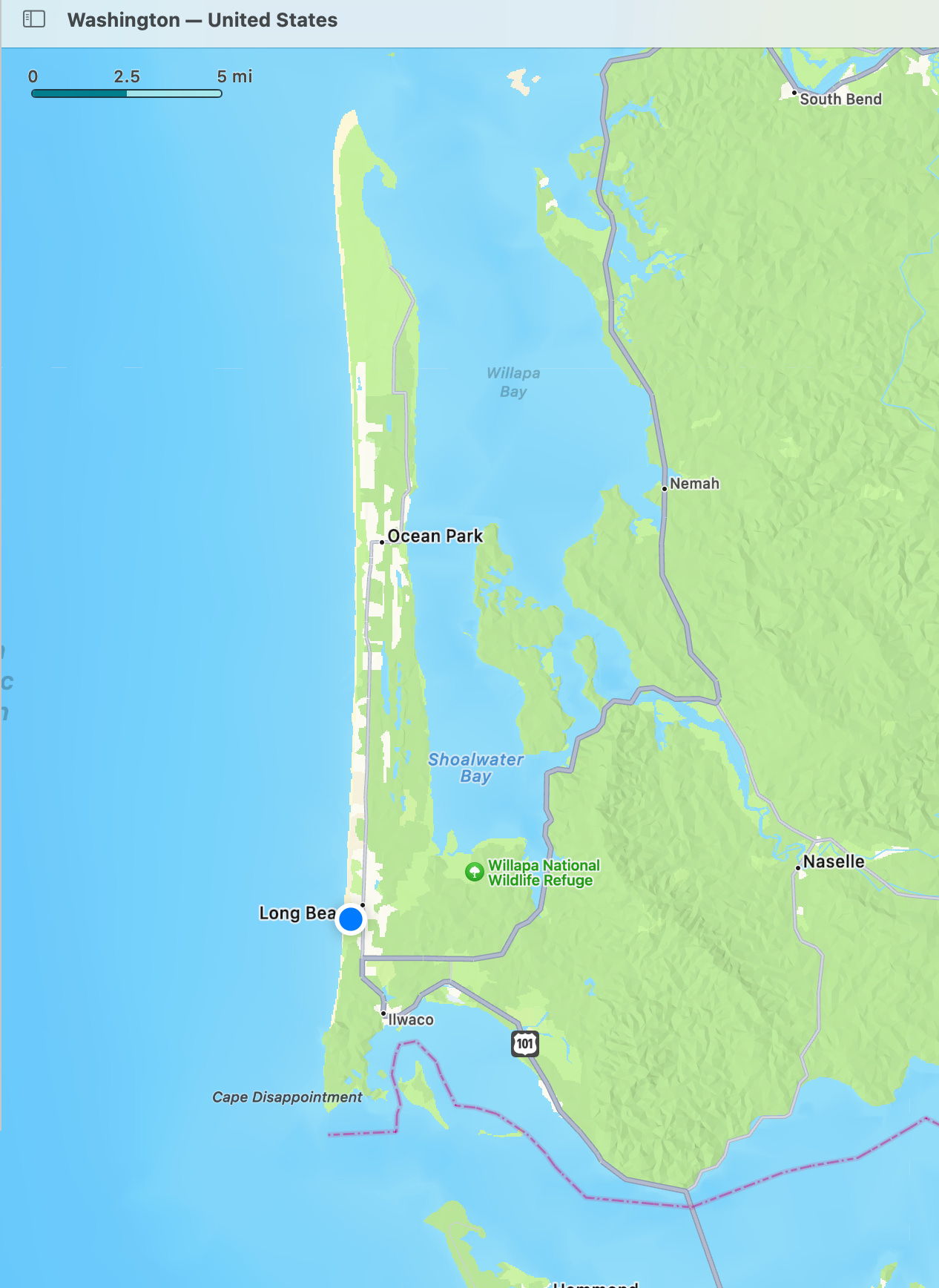
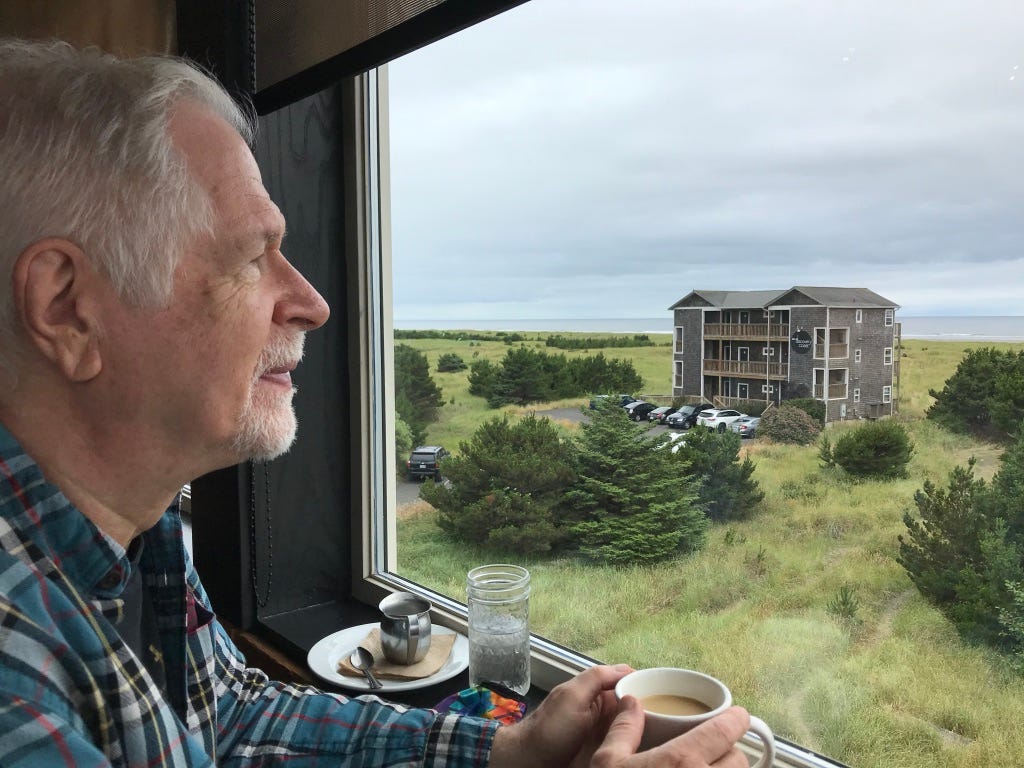
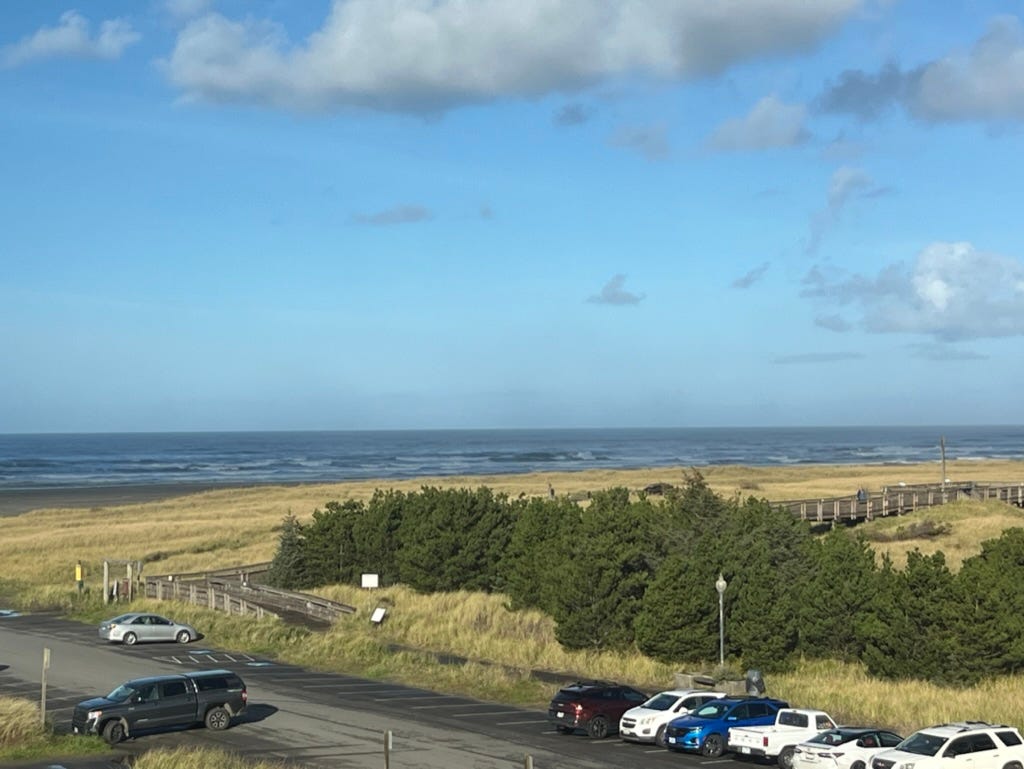
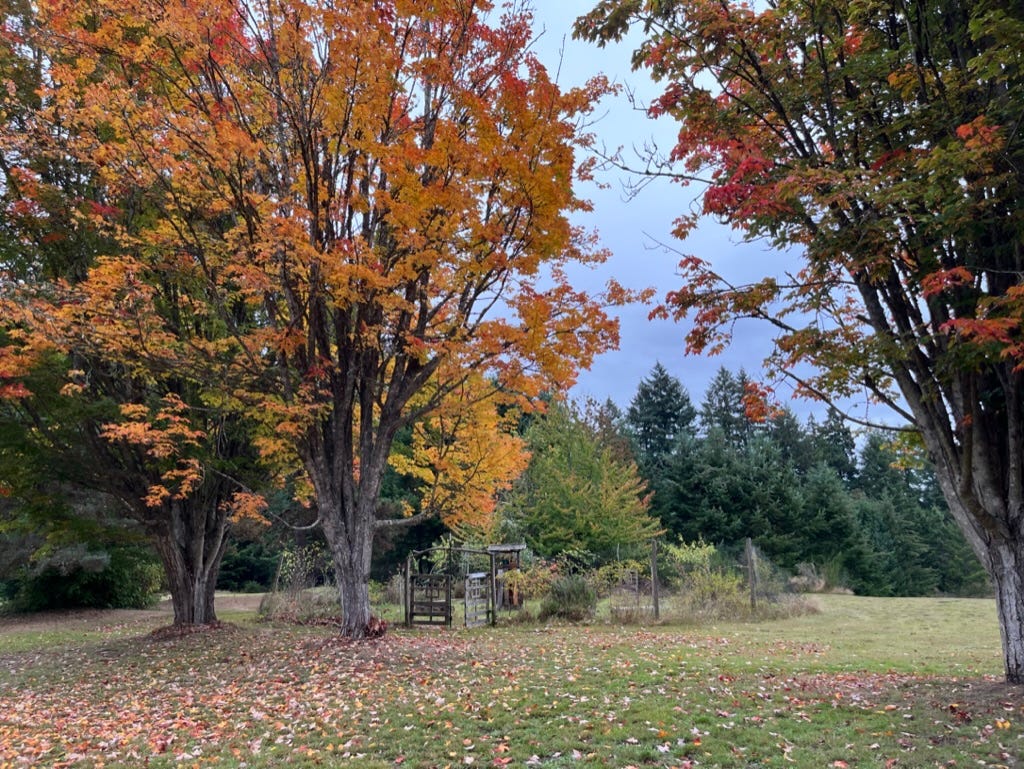
I loved reading about your journey to the ocean for respite. I find the salty sea resolves the tears and hunger for peace. Sending a deep breath to you, Bee!
Thank you Beverly. This beautiful piece brought me a lot of nourishment and empathy for the world's struggles, let alone our individual journeys. Thinking of all creatures today. xxx